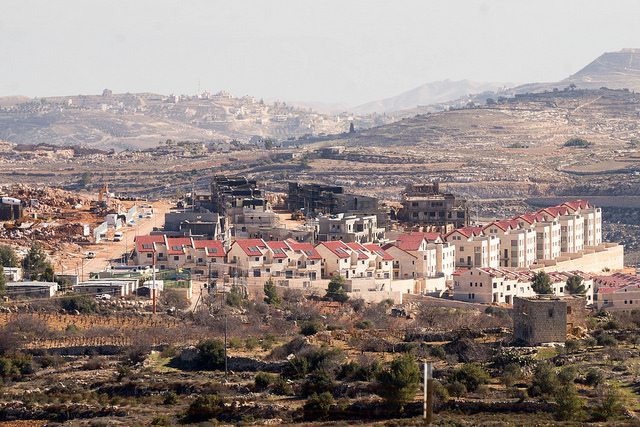BY MATT MCDOLE
The clatter of rocks on limestone brings our conversation to an abrupt halt as we dart for cover along the sides of the narrow street. Under the questionable protection of torn awnings, our group of Harvard graduate students resumes the journey into the heart of the medieval Palestinian City of Hebron. Overhead, nets and metal grates hang down, sagging under the weight of kitchen waste, dirty diapers, and rocks too large to pass through. We locate the likely stone-throwers when angry utterances in Hebrew emanate from a building high above us, where multiple Israeli flags flutter around a hastily-constructed vinyl-on-steel shed, the home of a settler. It squats stubbornly atop historic Palestinian homes.
We certainly didn’t have rocks thrown at us everywhere we traveled. The tense atmosphere and close proximity between Palestinian residents and Jewish settlers in Hebron isn’t characteristic of all settlements. Settlers themselves range from religious fanatics of the sort common in Hebron to secular economic settlers attracted to the West Bank by subsidized housing. Later, our group visited a more typical settlement called Kiryat Arba. It is built, as many Israeli settlements are, in a hilltop style that combines the best traditions of the Los Angeles gated community and the ancient Roman frontier fort. Here, settlers and Palestinians don’t have many opportunities to rub each other the wrong way – Palestinians are forbidden to enter, unless they are on a work permit.
Regardless of their form, settlements cause enormous problems for both Palestine and Israel. For Palestinians, the problem is obvious: settlements encroach on land that belongs to them under the Oslo agreement. However, settlements also threaten the survival of the Israeli state.
Each new settlement throws more dirt on the not-yet-buried coffin of the two-state solution, making the “one-state reality” more and more concrete. While right-wing Israelis are proponents of settlement and annexation, this path could paradoxically lead to either pariah status or demographic crisis for Israel.
Settlements threaten the two-state solution because evacuation is difficult and the Israeli settler population in the West Bank is increasing rapidly. When the Oslo Accords were signed in 1993, there were about 110,000 settlers. Today there are over 420,000 living in over 130 different settlements. These settlements undermine the spirit of Oslo, which was intended to usher in a process of Israeli withdrawal from the entire West Bank, the whole of which Israel agreed would be “gradually transferred to Palestinian jurisdiction.” Today, inaugurating the Palestinian state envisioned by Oslo would mean evacuating hundreds of thousands of Israeli settlers. The harrowing experience of forcibly evacuating 8,000 settlers from Gaza in 2005 leaves no doubt in Israel that an evacuation on a larger scale would be incredibly difficult to execute.
To make matters worse, leaders within the current Israeli government threaten to close off the last opportunities to make the two-state solution a reality by advocating annexation of even more Palestinian land. Israeli Justice Minister Ayalet Shaked, Agriculture Minister Uri Ariel, and Education Minister Naftali Bennett now openly advocate annexing the de-facto Israeli-controlled, less populated territory known as “Area C,” which makes up around 60 percent of the West Bank. While Netanyahu himself has not signed onto this plan, the growing popularity of far-right parties in his ruling coalition makes land grabs more likely. Such annexation would scupper all hope for a viable Palestinian state, leaving an archipelago of isolated Arab Bantustans in its place.
Many young Palestinians have begrudgingly come to accept the Israeli-imposed one-state reality. At a dinner we shared with a group of youthful, chain-smoking Palestinian undergraduates from Birzeit University, nearly every student had stories of close friends who had been wounded or killed by the Israeli Defense Forces (IDF). They seemed resigned to such tragedies. Over and over, we heard the refrain that they were tired of living under martial law and simply wanted occupation to end. A real Palestinian state? Yes, this would be good. But more urgent were basic civil rights that would make daily life bearable.
Pressure on Israel in support of civil rights for Palestinians is rising in the international community. The Boycott, Divestment, and Sanctions (BDS) movement, which attempts to influence the Israeli government using the same non-violent tactics that were used to end the South African apartheid, has spent most of the past decade in the wilderness. Recently, though, organizations like the US Presbyterian Church, the Gates foundation, and private companies like G4S have begun to divest. The American Jewish community, which once reliably backed Israeli policy, is beginning to fracture as progressive Jews and millennials increasingly join organizations that explicitly support BDS and oppose the occupation, such as IfNotNow and Jewish Voice for Peace. Alarmed by a movement it once ignored, the Israeli security apparatus has created an entire ministry charged with fighting BDS, along with a “tarnishing unit” whose mission is to defame its leaders.
If Israel continues down the path of settlements, annexation, and further geographic isolation of the Palestinian population, and if the next generation of Palestinians responds by re-framing the struggle as a non-violent movement for civil rights, it is unlikely the Israeli state will be able to resist the pressure to end its worsening apartheid.[1] But enfranchising the Palestinians living under the “one-state reality” could mean the end of a Jewish-majority Israel.
Some analysts argue that the two-state solution could still be salvaged if Israel agrees to trade some of its pre-1967 territory with Palestine in exchange for keeping the settlements near the 1967 border (80 percent of the settlements), and evacuating those, like Hebron, which lie deep within the West Bank. But land swaps would see Palestine giving up key areas in exchange for land populated by Israeli Arabs. These populations would lose their Israeli citizenship and come under military occupation in the West Bank. Land swaps would also seem to condone the violations of international law Israel committed in building the settlements in the first place. In any case, there would still be a great deal of involuntary evacuation of settlers. A 2014 poll found that only around 40 percent of Israeli settlers would leave willingly if compensated.
Today’s situation is dire. By promoting settlement in the West Bank that sabotages the two-state option, Israel risks forcing upon itself the unsavory choice between being shunned internationally or losing its Jewish demographic majority. If it wishes to avoid this dilemma, it should end the occupation and support a viable Palestinian state in the West Bank and Gaza. So far, it has sought to settle, annex, and control those areas, putting the two-state solution on life support. Those who wish to save it don’t have much time.
Matt McDole is a Master of Public Policy student at the John F. Kennedy School of Government at Harvard University and a Managing Editor at the Kennedy School Review. He served two tours in Afghanistan and is a graduate of the University of Virginia. He is passionate about journalism and untold stories.
Photo Credit: Ronan Shenhav via Flickr
Edited by Shanoor Seervai and Kimberly Howard
[1]The term “apartheid” has been defined by the UN as a general crime against humanity not limited to the South African context.

